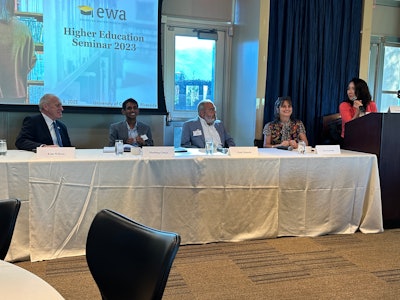RIVERSIDE, Calif--
As Americans express increasing skepticism about the value of higher education, how much colleges contribute to social mobility has come into the spotlight. With student debt spiraling out of control, people are increasingly interested in examining whether the tuition really pays off in terms of economic benefits. In recent years, the U.S. News and World Report has added measures of social mobility to its college rankings, and the Carnegie Foundation is currently looking into how social mobility can be incorporated into its all-important classification system. Suddenly, social mobility is getting the attention that it has long deserved.
With this as a backdrop, the Education Writers Association gathered a panel of experts to discuss social mobility as part of its annual Higher Education Seminar, hosted at the University of California, Riverside. It was clear that social mobility is increasingly important, but the best ways that colleges can help students achieve it and the best ways that it can be measured and communicated were less certain.
 The panel on social mobility at the University of California, Riverside.
The panel on social mobility at the University of California, Riverside.
“Higher education is coming back to its roots and recognizing its actual mission,” he said.
How social mobility is measured can lead to wildly different results, however. Dr. Kim A. Wilcox, chancellor of the University of California, Riverside, noted that his school’s rankings in the U.S. News and World Report and Washington Monthly are significantly different. U.S. News has had Riverside as the top-ranked school for social mobility for several years running, but in Washington Monthly, Riverside was #40.




















